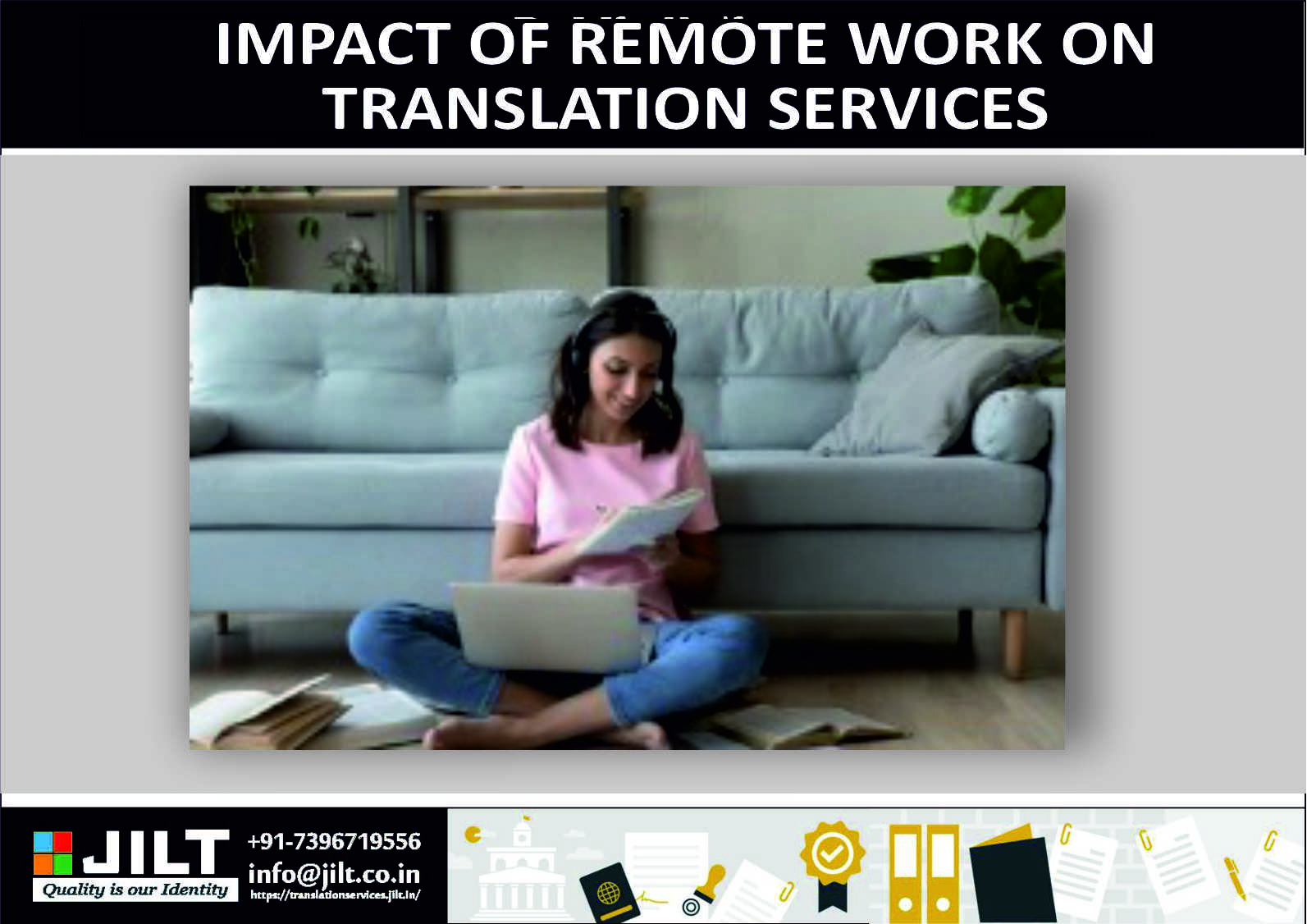
IMPACT OF REMOTE WORK ON TRANSLATION SERVICES
by Dr. Abu Mazhar Khalid Siddique - February 07, 2024
Impact of Remote Work on Translation Services
Because of technical improvements and shifting attitudes toward workplace flexibility, the global workforce has seen a dramatic shift toward remote work in recent years. This change has been driven by the combination of these two factors. This paradigm shift has not only reshaped the dynamics of traditional offices, but it has also had a huge impact on industries that rely largely on collaboration and communication. One of these industries that is going through a significant shift is the translation services business. Both obstacles and opportunities have been brought about as a result of the combination of language translation and remote labor, which has resulted in a transformation of the way in which linguistic experts operate and provide their services.
This blog digs into the complex relationship that exists between working remotely and the field of translation services, and it investigates the ramifications that this changing landscape may have. We will unravel the intricate tapestry of how remote work is transforming the world of translation, influencing quality, efficiency, and the general dynamics of linguistic communication. Topics that will be covered include the exploitation of modern tools, as well as the shifting demands of clients in a virtual setting.
The pandemic has accelerated current trends tremendously and set in motion a distant workers revolution unlike any other. The unexpected necessity to switch to remote work did not, however, catch all industries by surprise.
The majority of translation agencies had preexisting systems in place to effectively communicate when the pandemic hit. Thus, their workers were already doing remote work. The language industry, however, still had to change in some respects.
New Remote Work Opportunities
Embark on a thrilling journey into the uncharted territory of "New Remote Work Opportunities" where geographical limitations no longer hold your career back. From cutting-edge freelancing platforms to virtual collaboration technologies, you'll find a wide range of opportunities across industries. Learn how remote work is changing the game and how you can take use of it to achieve a better work-life balance, more flexibility, and more productivity. Whether you're an experienced worker or just starting out, this exploration will show you the limitless opportunities in the ever-changing field of remote work. As it develops, the future of work offers exciting new opportunities for personal and professional development.
As a result of the pandemic, the language industry has moved toward a more remote-first approach, and interpreters are a great example of how this shift has occurred.
Before the Covid-19 attack, Zoom was already doing quite well in the market. By the end of its first year of operation, it had accumulated a total of two hundred million meeting's minutes. On the other hand, the pandemic served as the ideal environment for growth that would have been impossible in the past. In the time that this article is being written, Zoom records more than 3.3 trillion meeting minutes annually.
Because of this increase, there are now a great deal of chances available for interpreters. The transition to providing interpretation services remotely was a challenge for many individuals who had previously given services on-site. Additionally, because Zoom provides simultaneous interpretation for webinars with live interpreters, there was a great deal of room for improvement in terms of accepting distant employment.
Consequently, despite the fact that the language sector was in a good position to deal with the travel restrictions that preceded the expansion of Covid-19, due to its strong foundation in remote working, there were still a lot of things that it needed to adjust. There is a significant difference between offering services as part of a remote-only arrangement and delivering them as part of a remote-first setup.
I would like it if you could expand it to the maximum number of words possible, using professional language, attentive sentences, and writing as if you were a human being.
What does it take to Work Remotely in the Language Industry?
Working remotely as a language professional requires a special blend of flexibility and expertise. Mastery of remote communication technologies and platforms is just as important as fluency in multiple languages. Remote language professionals rely on their good organizational skills to stay on top of their workload and fulfill deadlines. The ability to use digital interfaces and work in tandem with clients all across the world makes technological literacy critical for translators.
Translations that are both accurate and relevant to the context require an expert with cultural awareness and a sophisticated grasp of language subtleties. Whether it's through niche platforms or personal websites, establishing a strong online presence boosts exposure and draws in prospective customers. Success in the dynamic field of remote language work requires a regimented approach to work, regular check-ins with coworkers, and knowledge of current trends. Essentially, being successful remotely in the language industry calls for a perfect combination of language skills, tech knowledge, and the art of navigating the digital world.
Those who work remotely in the language industry, like those working remotely in other industries, are required to possess a specific set of fundamental abilities in order to be successful. Maintaining concentration and avoiding procrastination are two of the most important things to do, although happily, there are a lot of tools available to assist with the latter.
It is also very vital to have a good understanding of how to motivate yourself. Some people find that keeping track of the time while they are working allows them to experience surges of energy as they strive to do as much as they can in the short amount of time that is available to them. Motivating others can take many different forms for various people. Whether it be the desire to complete the task at a particular time, the establishment of quarterly goals, or the desire to reward yourself with a favorite pleasure, it may be anything. Every single translator, along with every other sort of remote worker, needs to figure out what works best for them in terms of their own particular motivations. It is possible that doing so will result in increased productivity fairly rapidly.
Is Working from Home Going to Have a Future?
The question that continues to be asked is whether working from home is a passing fad or a shift that will be here to stay in the professional environment. Dive into the discussion that surrounds the endurance of remote work and investigate the impact that it has had on different industries, organizational cultures, and the preferences of particular employees. Gain a deeper understanding of the ever-changing dynamics of virtual collaboration, the breakthroughs in technology, and the long-term ramifications of the global shift towards flexible work arrangements. This exploration examines the variables that are defining the future of work and considers whether or not working remotely is actually here to stay. Whether it is a transformative force that is reshaping established work structures or a transitory adaptation, this inquiry investigates the factors that are shaping the future of work.
Several organizations resisted the transition to remote work and promptly summoned their staff back to the office as soon as it was feasible. However, some individuals seized the chance to examine matters such as efficiency vs productivity prior to forming any assessment of how remote employment could potentially be leveraged to their benefit in the future. Consequently, numerous firms are presently engaging in trials of hybrid remote/office working arrangements.
Employee preferences are also a factor in this situation. A significant number of employees have discovered that remote work offers them an enhanced work-life equilibrium and are enthusiastic about maintaining it in either a full-time capacity or as part of a hybrid model. The ongoing discussion surrounding remote work has garnered significant attention, with individuals expressing their perspectives based on their personal encounters during the pandemic and their process of adjusting to working remotely.
It appears that remote working is a permanent fixture. And this applies not only to individuals employed by a translation company. By 2025, it is projected that a minimum of five days per month would be spent working from home by 70% of employees. Professionals in the language sector will undoubtedly continue to use new technology aimed at enhancing the efficiency of remote work.
Having a certain level of motivation is also beneficial - remote workers frequently need to be more proactive compared to those working in a physical office environment? Comprehending the method of accomplishing this in a rational manner, which acknowledges the boundaries of one's own jurisdiction, while simultaneously achieving tasks, is a crucial factor in achieving success in remote work.
CONCLUSION
The widespread impact of remote work has profoundly transformed the field of translation services, fundamentally altering the conventional landscape of language communication. Amidst the dominance of virtual collaboration in today's period, the influence on translation services is significant and complex. Today, linguistic experts use advanced tools and platforms to provide smooth translations across different locations in the digital world. The integration of remote work and translation has not only altered the way work is done but also caused a significant change in the expectations of clients and the models used for delivering services.
This investigation reveals the complex interaction between remote work and translation services, analyzing the difficulties and possibilities that have arisen. The impact of remote work on translation services highlights the adaptability and resilience of language professionals in a constantly changing global landscape. This is evident through the integration of advanced technologies and the evolution of quality standards in a virtual environment.
Our organization employs native-speaking translators who can provide certified translation services in any language. We provide translation services in English (Urdu), Arabic (Spanish), German (French), Persian (Iranian), French (Italian), Japanese (Korean), Russian, and any other Indian or local language. Expert proofreaders at our company will inspect the translation. We also provide a courier service to deliver completed documents to our clients.
- Also Read :- Business Documents Translation Services
- Also Read :- THE CRUCIAL ROLE OF LEGAL TRANSLATION: SAFEGUARDING IDENTITIES AND ENSURING GLOBAL COMPLIANCE
- Also Read :- Clinical Trial Agreement (CTA) Translation Services
- Also Read :- Single-status certificate translations (JILT - Certified Translation Services)
- Also Read :- Travel and Tourism Translation Services
- Also Read :- Birth certificate translation (JILT )
- Also Read :- Five important business communication languages for companies.
- Also Read :- Services for Technology Translation and Digital Localization
- Also Read :- THE IMPORTANCE AND USES OF SECONDARY SCHOOL CERTIFICATE TRANSLATION
- Also Read :- THE CONSEQUENCES OF TRANSLATED APPROVED LAYOUT MAPS IN LOCAL LANGUAGES IN INDIA.
Search
Categories
Archives by Month
Popular Blog
QUICK TRANSLATION QUOTE
Need help with a translation?
Get in touch with us
Whether you have a specific project you want to discuss, need a translation quote or simply want to discuss your requirements, do not hesitate to get in touch with us.











Social Networks